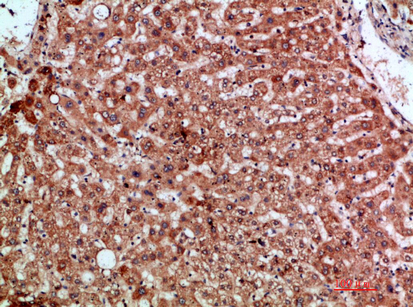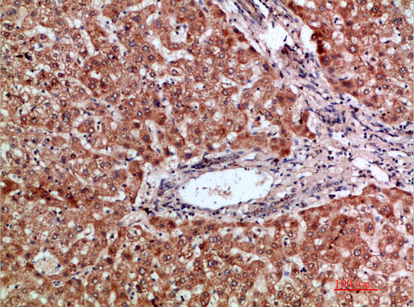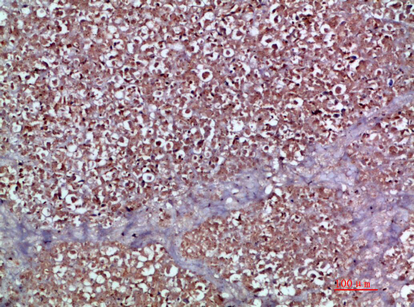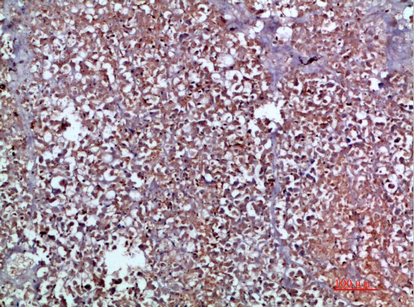



| WB | 咨询技术 | Human,Mouse,Rat |
| IF | 咨询技术 | Human,Mouse,Rat |
| IHC | 1/50-300 | Human,Mouse,Rat |
| ICC | 技术咨询 | Human,Mouse,Rat |
| FCM | 咨询技术 | Human,Mouse,Rat |
| Elisa | 咨询技术 | Human,Mouse,Rat |
| Aliases | C-C motif chemokine 20 (Beta-chemokine exodus-1) (CC chemokine LARC) (Liver and activation-regulated chemokine) (Macrophage inflammatory protein 3 alpha) (MIP-3-alpha) (Small-inducible cytokine A20) [Cleaved into: CCL20(1-67); CCL20(1-64); CCL20(2-70)] |
| Entrez GeneID | 6364; |
| Host/Isotype | Rabbit IgG |
| Antibody Type | Primary antibody |
| Storage | Store at 4°C short term. Aliquot and store at -20°C long term. Avoid freeze/thaw cycles. |
| Species Reactivity | Human,Mouse |
| Immunogen | Synthetic peptide from human protein at AA range: 31-80 |
| Formulation | Purified antibody in PBS with 0.05% sodium azide,0.5%BSA and 50% glycerol. |
+ +
以下是3条关于MIP-3α(CCL20)抗体的参考文献摘要概括:
---
1. **文献名称**:*CCL20 and β-defensin-2 induce arrest of human Th17 cells on inflamed endothelium in vitro under flow conditions*
**作者**:Hieshima K. et al.
**摘要**:研究利用抗MIP-3α/CCL20抗体阻断实验,揭示了CCL20在Th17细胞与炎症内皮细胞黏附中的作用,证实其通过CCR6受体介导免疫细胞迁移。
2. **文献名称**:*Selective recruitment of immature and mature dendritic cells by distinct chemokines expressed in different anatomic sites*
**作者**:Dieu-Nosjean M.C. et al.
**摘要**:通过抗MIP-3α抗体的免疫荧光和流式细胞术,证明CCL20在皮肤淋巴组织中特异性募集未成熟树突状细胞,调控局部免疫应答。
3. **文献名称**:*Expression of CCL20 by lipopolysaccharide-stimulated alveolar macrophages*
**作者**:Reibman J. et al.
**摘要**:采用抗CCL20抗体的ELISA和Western blot,发现脂多糖刺激下肺泡巨噬细胞高表达CCL20.提示其在肺部炎症中的潜在治疗靶点价值。
---
以上文献均涉及MIP-3α抗体的实验应用(如阻断、检测或定位),涵盖免疫调控、炎症机制等领域。如需具体文献来源,可通过PubMed或期刊官网输入标题进一步检索。
MIP-3α (macrophage inflammatory protein-3 alpha), also known as CCL20. is a small chemokine belonging to the CC subfamily. It plays a critical role in immune regulation by selectively attracting lymphocytes, dendritic cells, and other immune cells via interaction with its receptor CCR6. MIP-3α/CCL20 is involved in inflammatory responses, mucosal immunity, and lymphoid tissue development. It is highly expressed in tissues like the liver, lungs, and gut, particularly during infection, autoimmune disorders, or cancer. Dysregulation of MIP-3α has been linked to diseases such as rheumatoid arthritis, inflammatory bowel disease, psoriasis, and HIV infection, where it may facilitate viral entry through CCR6-mediated pathways.
MIP-3α antibodies are essential tools for studying its biological functions and therapeutic potential. These antibodies enable detection and quantification of MIP-3α in immunoassays (e.g., ELISA, Western blot), immunohistochemistry, or flow cytometry. Neutralizing antibodies can block MIP-3α/CCR6 interactions, offering insights into disease mechanisms or serving as candidate therapeutics. Both monoclonal and polyclonal variants are available, with applications spanning basic research to drug development. Recent studies also explore MIP-3α's role in tumor microenvironments, where it influences immune cell recruitment and cancer progression. As such, MIP-3α antibodies remain pivotal in dissecting immune pathways and advancing targeted therapies.
×